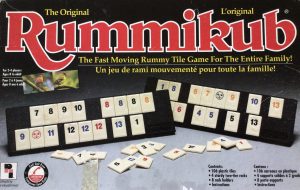
“One who puts on his armour should not boast like one who
takes it off.” I Kings 20:21
Generations of our family have played this Rummikub board game, and its box is somewhat dilapidated. Grandparent and grandchild alike can enjoy manipulating the tiles in strategic ways. Because of COVID, we’ve recently moved to an online version. Amazing that, even though we’re hundreds of miles apart, we can play and interact on Facetime at the same time.
Unfortunately, from our standpoint, even though our grandchildren are under ten years old, we are losing more often than we win. We should be able to take that with a modicum of grace and equilibrium because, after all, these winning grandkids are our progeny.
The other day, however, our little grandson, who turned five only a few months ago, graciously offered Grandma the option for a little assistance. “You can let Grandpa help you,” he said to me, kindly. Ouch!
The writing is on the wall, because from where we are, our mental agility isn’t likely to improve. However, maybe there are still lessons we could teach them. For example, how to lose graciously? How to win humbly?
In many movie scripts, the young characters are tested over the course of an epic journey. Initially they think they’ve got everything figured out, and clearly feel they know more about the world than their elders do. But eventually this unearned bravado is met by the reality of battle. It’s a necessary process on the way to seasoned maturity.
Life is a great teacher of real wisdom. If you are willing to learn, lessons are available from everyone in your life, whether they are “winners” or “losers.” Each of us has something to share from our experience. Youth naively believes that they can go out and conquer all obstacles. We understand there has to be something of that attitude even to attempt the challenges, and pray that they will persevere even if there will inevitably be times when they fail.
“If you can make one heap of all your winnings
And risk it on one turn of pitch-and-toss,
And lose, and start again at your beginnings
And never breathe a word about your loss;
. . . .
If you can talk with crowds and keep your virtue,
Or walk with kings – nor lose the common touch;
If neither foes nor loving friends can hurt you;
If all men count with you, but none too much;
If you can fill the unforgiving minute
With sixty seconds’ worth of distance run –
Yours is the Earth and everything that’s in it,
And – which is more – you’ll be a Man, my son!”
From “If,” by Rudyard Kipling